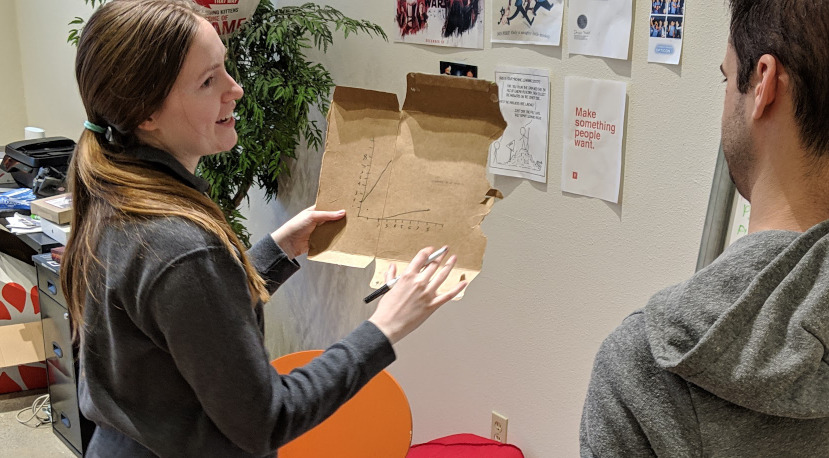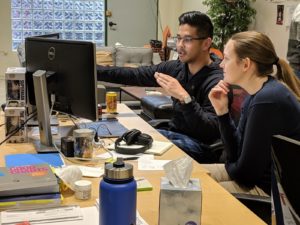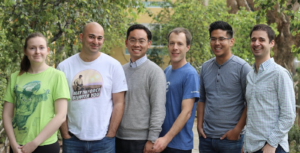Engineer #2 at ClearBrain (YC W18): Cynthia Rogers
by Ryan Choi10/1/2019

Cynthia Rogers, a CS graduate from WPI near Boston, made her move to San Francisco with no job lined up, a decision tree of startup failure outcomes and well wishes from her old team at DraftKings.
She landed at ClearBrain (YC W18) as the second eng hire, and found exactly what she wanted: a great mentor/manager, a strong technical team, and challenging work to keep her learning (but not overwhelmed). Read how she evaluates startups — both technically and culturally — and some useful tips she used along the way.
If you’re considering new opportunities, join YC’s Work at a Startup to connect directly with founders and find your next engineering role.
Ryan: Cynthia, before we talk about what it’s like at ClearBrain, you mentioned that you had some unconventional startup experiences right out of school.
Yes! I went to WPI [Worcester Polytechnic Institute], which is two hours outside of Boston. There are a lot of companies that hire out of there, and DraftKings was one of them. They were about 30 engineers at that time, and had just recently been dubbed a $1B unicorn startup.
I went through a pretty standard interview process, and was excited to get an offer. But I really wanted a better idea of what it was actually like to work there, both technically and culturally. So I asked if I could shadow an engineer for a day.
Ryan: Where did you come up with that idea?
[Laughs.] Well, I didn’t really know you couldn’t ask. I just figured that shadowing makes sense if you’re evaluating a first job. The company was only 30 engineers at that time — it was still small — and there weren’t any hiring processes, so they could be flexible. It didn’t cost them anything. So they agreed to it.
I got to shadow their first engineer Blake Dunkel, saw him work across the frontend and backend, sat in on meetings where he met with lots of engineers, drove agreement on design. I got a really good sense of the breadth of work. And it sold me excited on working there.

And then before you started at DraftKings, you made another great request.
When I was interviewing with other companies, one thing that stood out to me is how larger companies were offering rotational programs. That really resonated with me, because I didn’t have a good understanding on all aspects of engineering at that point. I wasn’t even sure what it meant to specialize. So I asked them if they could create a mini-rotational program, and they were excited about the idea.
And it turned out really well, because from the time I signed with the company to when I actually graduated and joined, the engineering team tripled — from 30 to over 100 people. Being on different teams let me tackle some pretty big problems across the stack. When the company saw spikes of 100x traffic on big game days and autoscaling would fail, the 2-person frontend team I worked on had to build solutions that just worked. DraftKings had to do emergency refactoring into SOA to keep up with traffic from our ESPN partnership, just a few months before the NFL season started. It was really exciting, because I got to learn a lot and work together in small teams.
Ryan: That’s a pretty intense experience. Were the other rotations like that?
The other rotation I really liked was on our Payments team. I found that I really liked APIs, and I loved working across the company with lots of different teams. But more importantly, I got better at design. We had a lot of really great people from Fidelity and VistaPrint who basically built a accounting system under the hood at DraftKings — with full ACID transactions, regional processing, payment instrument storage — all in MySQL. That was the first time I realized that I wanted to be at a smaller place where I’d be laying the foundation of something entirely new.
Ryan: Is that what got you thinking about joining a startup?
That was part of it. There was also a lot going on at DraftKings as it got bigger. For one, we put a lot of effort into a merger with FanDuel… that never happened. It was disappointing, and I still don’t know what happened at the C-level. It got me thinking about what was next, and that I wanted to be more exposed to critical decision making at a business. And the place where I felt that could best happen was at a startup.
Ryan: So then, how did you go about finding your next job?
I didn’t. I just packed up my stuff and drove cross country in a Mini Cooper. I didn’t have a job lined up, but I knew that I would be fine.
Ryan: [Nervous laugh.] That sounds… terrifying.
As an engineer working in Boston, coming to San Francisco is like the American Dream. At least, it was for me. There were a few moments where it was kind of scary. I read blog posts about other people’s startup experiences — going 3 months and not getting paid, or having the company go out of business.
But I also built out decision trees, associated probabilities on the leaves and worked out some of the worst case scenarios. And really, the most important thing for me is to develop my skill set. And in any of those outcomes, good or bad, I’d still get that. So I just needed to pick the right team to work with.
So when I got here, I googled “engineering startup positions”. It came up with Glassdoor, which looked like really big startups. I put my resume on another job board and got interviews my first week here. Clearbrain was one of them.
Ryan: What is it about ClearBrain that, in retrospect, stood out?
It fit all the criteria I was looking for.
First, I wanted to be challenged by the breadth of the engineering stack, but not be in over my head. And now that I’m here, I’m really excited, getting to learn again, and I love increasing my breadth. I really get to build the foundations of this company, unlike at big companies where that stuff is already there. Every day I feel like I can create something, which is exactly what I looking for.
Second, I wanted a team with the knowledge, experience and motivation to help me keep learning and developing my skill set — as quickly as possible. And I got that, even as just the second eng hire on the team. Our CTO [Eric Pollman] was at Google for 10 years, part of the first wave of the ads team, pre-IPO. [Eric] Siroker was also at Google and was the first engineer at Optimizely. I can lean on their depth of engineering experience to keep learning — about infrastructure, network configuration, and just pick their brains on anything.
And lastly, Bilal [Clearbrain’s CEO] has been a great manager, and has treated me like a peer, from day one. Even before I started, he told me, “I’m not just hiring you as an engineer. I care about your product opinions.” And I’ve gotten to be a part of the decision making process every step of the way.
And as CEO, he still has 1-1s with every person on the team. He’s almost like my career guidance counselor. He has me come up with yearly goals, and aligns work opportunities that tie to my own long-term objectives. He always says, “Don’t forget about these things when you’re in the trenches, building out systems. You need to remember to make progress to what’s going to make you happy.”

Ryan: What’s an example of that?
Well, I’ve had conversations with him about seeing what management is like. And in a smaller company, it may not seem like you have those opportunities. But we brought on interns from the YC internship program for the summer, and I got to mentor and oversee their work. It was a great learning experience, and it showed me how amazing it is to work with engineers who are really good at what they do.
And another time, we had a discussion about career options and possibly starting a company. So Bilal reached out to other YC founders and they made time to have 1-1s with me and share their experiences. That was a really unique perspective and I gained a lot of data points.
It also made me realize how tightly connected the bay area is. Especially as somebody who didn’t start off with as many connections here. And even more so in the YC network. I mean, before I moved out here, I didn’t really know what YC was. But being an early engineer at ClearBrain before we got into YC, and then going through it has been great. Bilal would come back, share what the speakers at the dinner talked about, and then open it up for discussion for our team: “This is what I’m thinking, what are you guys thinking?” We really felt like we were a part of the process and the evolution of the company.
Ryan: So… will you be starting a YC company some time soon?
[Laughs.] Well, one of my mentors used to always say, “Once you go away from engineering, it’s harder to go back to it.” And that more time as an engineer helps you be a better manager. Building my skill set is the most important thing to me, my most important asset. I get to do that here. That alone is far more enticing than dealing with big company politics, people internally competing for work, or jockeying for titles. I don’t have time for that.
There’s enough interesting work to go around at ClearBrain. I get to go back to learning ML, which is what I studied a bit of at school. We’re more willing to try new things, beta technologies, because we’re a startup. I want to learn more product stuff, build out more infrastructure. I’m getting to learn about GCS and AWS pricing, which is surprisingly a big part of running a business.
So eventually, maybe. But for now, this is a really efficient way to learn and develop my skills, for whatever happens next.
Categories
Other Posts
What startup hiring looks like in 2021 — and during a pandemic
January 17, 2022 by Ryan Choi
Author
Ryan Choi
Ryan works with YC companies to find great engineers — from 2-person startups to larger ones like Airbnb, Stripe and Instacart.